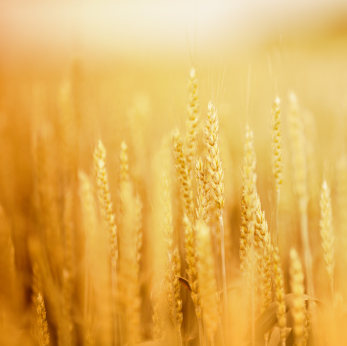A Faithful Steward or a Careless Servant
 by Inid Starrenburg
by Inid Starrenburg
“And He said to them, be careful what you are hearing. The measure [of thought and study] you give [to the truth you hear] will be the measure [of virtue and knowledge] that comes back to you-and more [besides] will be given to you who hear. For to him who has will more be given; and from him who has nothing, even what he has will be taken away [by force]. And He said, the kingdom of God is like a man who scatters seed upon the ground, and then continues sleeping and rising night and day while the seed sprouts and grows and increases- he knows not how. The earth produces [acting] by itself-first the blade, then the ear, then the full grain in the ear.
But when the grain is ripe and permits, immediately he sends forth [the reapers] and puts in the sickle, because the harvest stands ready. And He said, with what can we compare the kingdom of God, or what parable shall we use to illustrate and explain it? It is like a grain of mustard seed which, when sown upon the ground, is the smallest of all seeds upon the earth; yet after it is sown, it grows up and becomes the greatest of all garden herbs and puts out large branches, so that the birds of the air are able to make nests and dwell in its shade”
Mark 4:24-32 AMPC
“Peter said, Lord, are You telling this parable for us, or for all alike? And the Lord said, who then is that faithful steward, the wise man whom his master will set over those in his household service to supply them their allowance of food at the appointed time? Blessed (happy and to be envied) is that servant whom his master finds so doing when he arrives. Truly I tell you, he will set him in charge over all his possessions. But if that servant says in his heart, My master is late in coming, and begins to strike the menservants and the maids and to eat and drink and get drunk, the master of that servant will come on a day when he does not expect him and at an hour of which he does not know, and will punish him and cut him off and assign his lot with the unfaithful. And the servant who knew his master’s will but did not get ready of act as he would wish him to act shall be beaten with many [lashes]. But he who did not know and did things worthy of a beating shall be beaten with few [lashes]. For everyone to whom much is given, of him shall much be required; and of him to whom men entrust much, they will require and demand all the more. I have come to cast fire upon the earth, and how I wish that it were already kindled!”
Luke 12:41-49 AMPC
As I read these scriptures, I was reminded about other parables where Jesus taught about readiness and maturity. There is a parable in particular that I connected to about ten virgins who were waiting for the Bridegroom. Some had extra oil for their lamps, prepared for a long wait, and some did not. Those that did not ran out, and had to go back for more oil. In doing this, they missed the Bridegrooms arrival. They were not ready. They knew the wait may be long, but chose to go without reserves they may need. These virgins endured a consequence because of their choice to be careless and unprepared.
A while back, while praying in preparation for a meeting, I received a picture of a field of crops, tall, full, and ready for harvest. In the field was a woman walking, just strolling along looking, observing the field, but nothing else. God told me one word about that picture: Invitation.
I was reminded of the significance of that picture as I continued to meditate on these passages of truth.
I have never farmed though I lived as a child in a rural town surrounded by a farming community. I researched “harvest” and here is what I learned. Harvesting involves the use of a sickle or a reaper, and is the most demanding part of the growing season. The grain is bundled or gathered, then separated from the stalk to be ground into flour, having some grain saved to begin the next growing season. This selected grain must be stored carefully. The windup of harvest is the end of the growing season of a particular crop. Crop failure can be caused by many things such as drought, heavy rain, plant disease or soil deterioration that affects the plant in such a way that the fruit, seeds or leaves are no longer edible.
We are all parts of One Body. We may be one of the hands, one of the feet, one of the eyes, but are all together One Body. Our roles as different members of One Body in regard to the harvest may differ from one another, but the invitation is for us all. We may differ from one another in our level of intimacy with Christ, still we are all called, all invited to participate in the harvest. It is simply our responsibility to respond to that call.
What role is mine within the harvest? Will I choose to be a faithful steward, or a servant who knows what my master wishes, but does not get ready and act?
